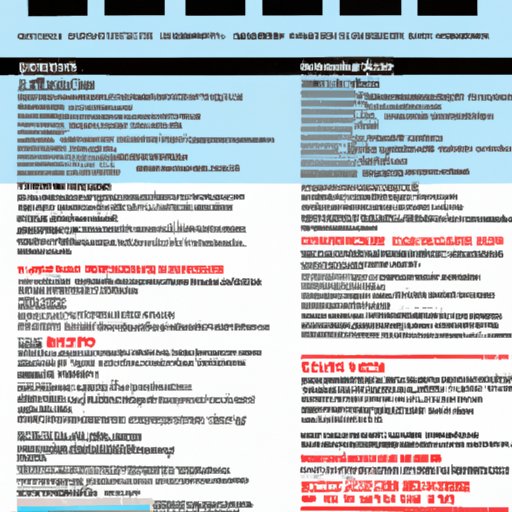Introduction
Information technology (IT) is one of the most popular and fastest-growing careers in today’s world. With advancements in technology happening at lightning speed, the demand for IT professionals has never been higher. If you’re looking to pursue a career in IT, there are several factors to consider before taking the plunge. This article explores how to start a career in IT, from researching the field to preparing for interviews.
Overview of the IT Field
Information technology is a broad field that encompasses a wide range of activities related to managing and processing data. According to the U.S. Bureau of Labor Statistics, “most computer specialists have a bachelor’s degree in a computer-related field and experience with different types of computer systems and technologies.” Common IT roles include software engineering, network administration, web development, database management, and cybersecurity.

Reasons Why Someone Should Pursue a Career in IT
Pursuing a career in IT can be rewarding for many reasons. For starters, it offers great job stability. The U.S. Bureau of Labor Statistics projects employment of IT professionals to grow 12% from 2018 to 2028. This is much faster than the average growth rate for all occupations.
The salary potential in IT is also quite attractive. According to the 2019 Robert Half Technology Salary Guide, the median salary for an IT professional is $86,500 per year. With experience and additional certifications, this number can easily rise into six figures.
Finally, IT professionals have the opportunity to work on interesting and challenging projects. From developing cutting-edge software to designing secure networks, no two days in IT are ever the same.
Researching the IT Field
The first step to launching a successful IT career is to gain a better understanding of the industry. Researching the types of IT jobs available, the skills and qualifications needed, and what employers are looking for in candidates will help you make informed decisions about which path to take.
Types of IT Jobs Available
There are numerous types of jobs in the IT field. Some of the most common include:
- Software Engineer
- Network Administrator
- Web Developer
- Database Administrator
- Systems Analyst
- Cybersecurity Analyst
Skills and Qualifications Needed
In order to be successful in the IT field, you need to possess a certain set of skills and qualifications. Common skills include problem-solving, critical thinking, coding, and troubleshooting. It is also important to have knowledge of specific software programs and operating systems. Most employers prefer candidates who have a bachelor’s degree in a computer-related field.
What Employers Are Looking for in Candidates
When hiring for IT positions, employers typically look for candidates who possess the following qualities:
- Strong technical skills
- Ability to communicate effectively
- Attention to detail
- Problem-solving aptitude
- Ability to work independently and as part of a team
Networking with IT Professionals
Networking is a key component of any successful career in IT. Reaching out to local professionals in the industry is a great way to gain insight into the field and learn what it takes to get started. Attending meetups, conferences, and other events is also a great way to build connections and gain valuable advice.
Reaching Out to Local Professionals
One of the best ways to learn more about IT is to reach out to professionals in the field. Connecting with people who already work in IT can provide invaluable insight into the industry, including tips on how to get started and what to expect. LinkedIn is a great resource for connecting with local professionals in the industry. You can search for professionals in your area and reach out to them directly.
Gaining Insight into the Industry
Talking to experienced IT professionals can give you a better understanding of the industry and what it takes to succeed. They can provide advice on which certifications to obtain, what employers are looking for in candidates, and what to expect in terms of salary and job satisfaction.
Learning What It Takes to Get Started
Talking to IT professionals can also help you learn what it takes to get started in the field. They can provide guidance on the skills and qualifications needed, what types of jobs are available, and how to stand out from other candidates. Learning from their experiences can help you make informed decisions about launching a career in IT.
Obtaining Professional Certifications
Professional certifications are an important component of any successful IT career. They demonstrate that you have the knowledge and skills needed to perform certain tasks. Obtaining certifications can also help you stand out from other candidates when applying for jobs.
Benefits of Certifications
Certifications have several benefits. They demonstrate to employers that you have the necessary skills and expertise to do the job. They can also lead to higher salaries and more job opportunities. According to a survey by Global Knowledge, certified IT professionals earn an average of 15% more than their non-certified counterparts.
Demonstrating Knowledge of IT Fundamentals
Certifications are also a great way to demonstrate your knowledge of IT fundamentals. Many certifications require passing exams that test your knowledge and understanding of various IT concepts. Earning these certifications is a great way to prove that you have the skills and expertise needed to succeed in the field.
Showcasing Specialized Skills
Finally, certifications can help you showcase specialized skills. For example, if you’re interested in pursuing a career in cybersecurity, obtaining certifications in security-related topics such as ethical hacking or penetration testing can demonstrate to employers that you possess the necessary skills.
Creating a Professional Resume
Once you’ve gained a better understanding of the IT field, the next step is to create a professional resume. Your resume should highlight your IT experience and education, as well as any certifications you have obtained. Crafting a resume that stands out from other candidates is essential to landing a job in IT.
Highlighting IT Experience and Education
Your resume should clearly outline your IT experience and education. Listing any relevant courses you have taken and any IT-related jobs you have held is a great way to demonstrate your knowledge and skills. Be sure to include any certifications you have earned as well.
Crafting a Resume That Stands Out
When crafting your resume, it is important to make it stand out from other candidates. Include any awards or achievements you have earned, as well as any volunteer work or extracurricular activities related to IT. Highlighting your unique skills and experiences can help you stand out from the competition.
Searching for Job Opportunities
Once you’ve crafted a professional resume, the next step is to start searching for job opportunities. There are a variety of resources available to help you find the right position. Sites such as Indeed, Monster, and Glassdoor are great places to start your search.
Matching Skill Set with Job Postings
When searching for jobs, it is important to match your skill set with the job postings. Read through each posting carefully and make sure that your skills and qualifications match the requirements listed. If you don’t meet the requirements, don’t apply for the job.
Applying for Positions That Interest You
Once you’ve identified job postings that match your skill set, the next step is to apply for the positions that interest you. Make sure to include a cover letter with your resume, outlining why you are the ideal candidate for the job. Following up with the employer after submitting your application is also recommended.
Preparing for Interviews
Once you’ve submitted your applications, the next step is to prepare for interviews. Doing research on the company and practicing interview questions are essential to making a good impression. Preparing a portfolio of your work is also recommended.
Practicing Interview Questions
It is important to practice interview questions before attending an interview. Knowing how to answer common questions such as “tell me about yourself” and “why should we hire you?” can help you stand out from the competition. The more prepared you are, the better your chances of getting the job.
Reviewing Resume and Portfolio
Before attending an interview, it is also important to review your resume and portfolio. Make sure that all of the information is up-to-date and accurate. Having a portfolio of your work is also a great way to demonstrate your skills and expertise.
Staying Up-to-Date on Latest Technologies
The IT field is constantly changing, so it is important to stay up-to-date on the latest technologies. Participating in online forums and attending IT conferences are great ways to stay ahead of the curve. Keeping your skills sharp is essential to succeeding in the IT field.
Keeping Skills Sharp
It is important to keep your skills sharp to stay competitive in the IT field. Taking online courses and reading industry blogs are great ways to stay up-to-date on the latest technologies. Joining professional organizations such as the Association for Computing Machinery is also recommended.
Participating in Online Forums
Participating in online forums is another great way to stay up-to-date on the latest technologies. Forums such as Reddit and Stack Overflow are great places to ask questions and discuss topics related to IT. Getting feedback from experienced professionals can help you stay ahead of the game.
Attending IT Conferences
Attending IT conferences is also a great way to stay up-to-date on the latest technologies. Conferences such as DEF CON and Black Hat are great opportunities to network with IT professionals and learn about the latest developments in the industry.
Conclusion
Launching a successful career in IT requires research, networking, and preparation. From researching the field and gaining insight into the industry to obtaining certifications and creating a professional resume, there are several steps to take before starting a career in IT. Finally, staying up-to-date on the latest technologies is essential to succeeding in the field.
(Note: Is this article not meeting your expectations? Do you have knowledge or insights to share? Unlock new opportunities and expand your reach by joining our authors team. Click Registration to join us and share your expertise with our readers.)
